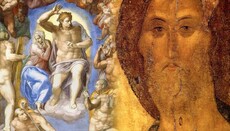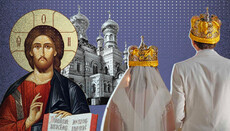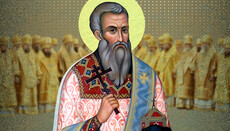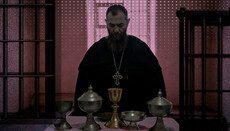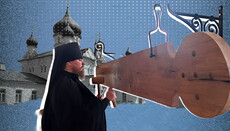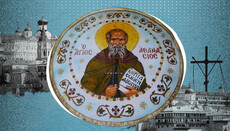“Picasso”: Admission to the Seminary and the Schism
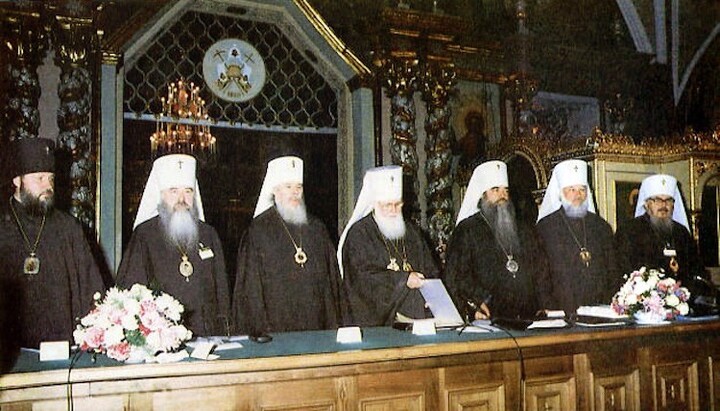
Excerpt from the book “Picasso. Part One: The Slave.” Episode 13
Time: 1992
Place: Kyiv
Characters: Fr. Alexander Kaminsky; Misha Kaminsky, his son
Misha Kaminsky had finally begun to visit the Caves. There was nothing left for him to ask for – he simply knelt before the relics of the venerable Moses the Hungarian, laid his hand upon the saint’s tomb, and bowed his head low. He would stand like that for hours. Pilgrims brushed past him in the narrow corridor, but he stood, and stood... Without those silent hours of prayer, he would not have endured.
It was over between him and Nastya. She could not forgive what had happened.
Misha confessed his sin honestly to his father. When Fr. Alexander finished reading the prayer of absolution, he asked quietly:
“What will become of Nastya now, eh?”
“Now she will have to decide for herself,” his father said with a shrug. “You can’t do anything more here.”
Yet Fr. Alexander did do something. He sought permission from the Lavra authorities and served a moleben together with his son in the Near Caves, before the relics of the righteous virgin Juliana, Princess of Olshany. Afterward he said:
“I’ll go – you stay a little longer and pray in your own words.”
Whether Misha’s prayers were heard or it all simply worked out that way, no one knows – but Nastya did not go running to Belkovich.
Like someone in a dream, Misha finished school, passed his final exams, and was accepted to the seminary.
Only by mid-summer did he begin to recover from everything. One day, after another visit to the Caves, he announced to his father and his friend Georgy:
“That’s it! I’ve decided to become a monk!”
Georgy rejoiced as though welcoming home the prodigal son:
“Oh, brother! At last you’ve found the true path!”
But Fr. Alexander’s reaction was unexpected:
“Just don’t tell God yet. All right?”
* * *
Misha Kaminsky’s admission to the Kyiv Theological Seminary came at a most difficult time. In the spring and summer of 1992, a church schism descended upon the Orthodox Church, which had only just begun to rise from the ashes after seventy years of godless Soviet rule.
The Primate of the Ukrainian Orthodox Church, Metropolitan Filaret (Denysenko) – who had held that post since 1966 – was still bitter over his failure to become Patriarch of Moscow after Patriarch Pimen’s death in 1990. Longing to don the patriarchal koukoulion, he conceived a new plan: to separate the Ukrainian Church from the Russian and make himself patriarch, if not in Moscow, then at least in Kyiv. But the other bishops and clergy were far from delighted by the idea – and so they soon found themselves on opposite sides of the barricades.
In early April 1992, the Archpastoral Council of the Russian Orthodox Church met in Moscow, with the participation of Ukrainian hierarchs as well. There Filaret spoke eloquently, urging that the Ukrainian Church be granted full independence – autocephaly – naturally with himself at its head.
Then came the reckoning.
It suddenly turned out that only six bishops out of the twenty-one who had come from Ukraine supported his idea. The faithful flock was almost entirely opposed – in some eparchies, categorically so. Moreover, the principle “an independent state must have an independent Church” had long before been condemned by a Church Council as the heresy of ethnophyletism. What could be done?
The Council decided to issue an “Appeal to the Episcopate, the Clergy, and all the Faithful Children,” the essence of which was this: such historic questions as autocephaly are not decided on the spot simply because Filaret desires to become patriarch – or because Ukrainian politicians wish to have a national Church of their own.
Autocephaly is no simple matter. It requires the consent of all existing Local Orthodox Churches, not just the Russian and the Ukrainian. Most importantly, the Ukrainian Church itself must be of one mind – and that unity was nowhere to be seen. The Appeal essentially said: think the matter over carefully among yourselves in Ukraine; if clergy and laity alike are truly of one heart in desiring independence, then we shall convene a Local Council and resolve your question in the spirit of peace and brotherly love.
The Appeal was phrased in diplomatic tones, yet it was perfectly clear that an “independent Church” was desired chiefly by the leaders of the “independent state” – a state that had fallen into their hands barely a year earlier. In the two-thousand-year history of the Church, worldly rulers have almost always tried to bend the Church to their will – for it is far easier to rule a people when you rule their priests as well. Independence was also tempting to certain churchmen who saw in it a ladder for their own career advancement.
At the same Council in Moscow, Metropolitan Filaret was accused of various moral failings accumulated over twenty-six years of leadership: an authoritarian style of rule, and a not-so-secret domestic life that a monk should not be leading.
The discussion confirmed that these accusations were not without basis. With the coming of glasnost, such reports increasingly appeared in the press, scandalising both believers and unbelievers. It seemed far better for His Beatitude Metropolitan of Kyiv and All Ukraine to retire quietly, living out his days in honour and respect – leaving his personal sins to the judgement of God. Reluctantly, Filaret agreed and swore an oath that he would step down.
The Ukrainian bishops, long weary of his domineering ways, rejoiced – but things proved less simple. The devil, as always, hid in the details. Filaret declared: “I am so respected and beloved by the Ukrainian flock that if I am removed here in Moscow, the people will rise up – they’ll say, ‘the cursed Moskals have robbed us of our true father.’ Better I go back to Kyiv, convene my own Ukrainian Council, and resign properly.”
The bishops were uneasy – what if he lied? But Filaret publicly swore, before the Cross and the Gospel, and they believed him. They should not have.
Upon arriving in Kyiv on April 14, 1992, Filaret called a press conference and declared that in Moscow he had been “crucified on Golgotha,” that he had endured his own passion – and that he would resign nowhere and never.
Everyone was stunned. When asked about his oath before the Cross and the Gospel, he replied that it had been merely a diplomatic gesture – a trifle – and that he was “a gift from God to the Ukrainian people.”
And so it began. The faithful indeed rose up – but not for Filaret, rather against him. The truth cannot be hidden, and soon everyone knew that at the Council in Moscow he had sworn to resign. Breaking oaths is no small thing. In most churches his name ceased to be commemorated at the Liturgy. In every eparchy “Committees for the Defense of Orthodoxy” sprang up, holding meetings and collecting signatures for his removal. Two bishops who tried to support him were gently taken by the arms and escorted away – one from the Odesa Eparchy, another from the Pochaiv Lavra. Such was the people’s love for Filaret.
Seeing all this, Patriarch Alexy II of Moscow and All Russia convened an enlarged Synod with Ukrainian bishops, which decided to remove Metropolitan Filaret from office and temporarily assign his duties to the senior Ukrainian hierarch by ordination – Metropolitan Nikodim (Rusnak) of Kharkiv. He was to convene a Council in Ukraine, formally accept Filaret’s resignation, and elect a new primate.
But Filaret did not sit idle. On May 26, 1992, he gathered his supporters at a forum grandly called “The All-Ukrainian Conference in Defense of the Canonical Rights of the Ukrainian Orthodox Church.” Not a single bishop of that very Church attended. Despite this “minor misunderstanding,” the conference declared: “Every bishop who has departed from his canonical head, Metropolitan Filaret, is a traitor to the Church and the Orthodox people of Ukraine and is therefore liable to defrocking according to the canons.”
The next day, May 27, in Kharkiv, the Council of those bishops who had ignored the conference assembled. In fairness, three were absent: one citing illness, two sending letters of agreement with whatever decision the majority would make. The Council removed Filaret (Denysenko) from office, forbade him from serving, and elected a new primate – Metropolitan Volodymyr (Sabodan).
Filaret banned everyone; everyone banned Filaret. The schism had begun and was gathering momentum.
The question of who was right now stood before many souls with inescapable force – before sincere believers, priests, and laypeople alike. At first glance, it seemed simple: one bishop had defied the conciliar will of the Church, and therefore was in the wrong. Yet church history knew cases when a solitary bishop had stood on God’s side while all the rest strayed into deceit.
It was precisely this difficult choice that troubled the soul of Misha Kaminsky, who had just submitted his documents to the Kyiv Theological Seminary – all the more so since the seminary’s rector had taken the side of the now former Metropolitan Filaret.
To be continued...
The previous episode of the book is available here.
